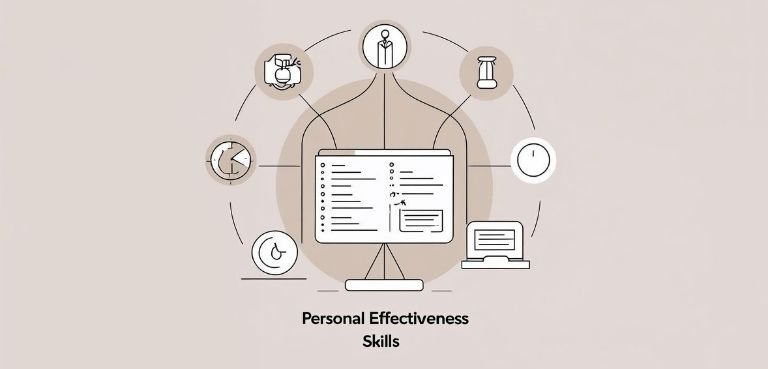No products in the cart.
Let’s get right to it—personal effectiveness skills are the ones that help you get things done, even when life’s messy. They’re the everyday skills that help you show up on time, stay focused, stay calm under pressure, and work well with others. They’re the skills that turn “I’ll do it later” into “It’s already done.” And trust me, once you start using them, you’ll wish you learned them years ago.
What Are Personal Effectiveness Skills?

These are the tools you use to manage yourself. Not your job title. Not your qualifications. You. They include time management, emotional control, goal setting, clear communication, and decision making. You don’t need to be born with them. You build them, step by step, by paying attention to how you work, how you think, and how you react. It’s not just about what you know. It’s how you use what you know.
Why Personal Effectiveness Skills Matter in the UK Workplace
In today’s world, qualifications get your foot in the door. But personal effectiveness keeps you in the room. Employers across the UK want people who follow through. Who stays calm under pressure? Who doesn’t crumble when the Wi‑Fi cuts out or a shift goes sideways? These skills help you work smart, not just hard. They help you balance client needs, team deadlines, and your own stress levels without burning out.
1. Time Management: The Skill Everyone Thinks They Have (Until They Don’t)
We’ve all said it: “There’s not enough time.” But time isn’t the problem. The real issue is how you use it. Time management means planning your day, setting priorities, and sticking to them. It’s knowing the difference between what’s urgent and what’s important. It’s also about leaving space for breaks so your brain doesn’t fry by lunch. Try the “two-minute rule”—if a task takes under two minutes, do it now. You’ll be shocked how much that clears your plate.
2. Emotional Control: Keep Your Cool When Stuff Hits the Fan
Your mood walks into the room before you do. And when you’re in a high-stress job—like anything in health and social care—emotions can run high. Personal effectiveness means you don’t let stress spill out onto your clients or your coworkers. It’s okay to feel frustrated. Just don’t let it drive the bus. Breathe, pause, respond. When something triggers you, take a step back. Ask: “Is this something I can fix or just something I need to ride out?”
3. Goal Setting That Actually Gets You Somewhere
A lot of people set goals. Fewer people hit them. Why? Because they don’t break them down. Saying “I want a promotion” sounds great, but what are the steps? What do you need to learn? Who do you need to talk to? Break goals into weekly actions. Track them. Celebrate the small wins. That’s how momentum builds. Small progress is still progress.
4. Clear Communication: Say What You Mean (Without Waffle)
Being clear doesn’t mean being blunt. It means saying what needs to be said in a way people understand. You don’t need fancy words. You need the right words. Listen first, speak second. Use simple language. If you’re giving instructions, check that the other person got the message. If you’re asking for help, say what you need, not just what’s going wrong. People can’t read minds, but they can follow straight talk.
5. Decision Making: Stop Overthinking and Start Choosing
You make decisions every day. Some feel small—what to wear, what to eat. Others matter—how to handle a tricky client or respond to a sudden change. The key? Don’t let fear freeze you. Gather just enough info to make a smart call. Then act. If it works, great. If not, adjust. Personal effectiveness means you don’t wait for perfection. You move with purpose and tweak as you go.
6. Self-Awareness: Know Your Triggers, Limits, and Strengths
The best way to grow is to know where you’re starting. Self-awareness means you know how you react under pressure. You spot when you’re avoiding something or losing focus. You understand your strengths and where you tend to slip up. Maybe you rush details. Maybe you avoid conflict. Knowing these things lets you build systems to stay on track. It’s not about shame. It’s about strategy.
7. Prioritisation: Do the Right Things First
Not all tasks matter equally. Some just feel loud. Others actually move you forward. Being effective means sorting what truly needs doing today, and what can wait. Ask yourself: “What will matter most at the end of this shift?” Start there. Tackle the big stuff first. Don’t just tick off easy wins. Chase impact, not just activity.
8. Flexibility: When the Plan Changes, You Don’t Fall Apart
Let’s be real—plans change, especially in the real world. A patient cancels. A report gets delayed. A coworker calls in sick. Effective people don’t panic. They adjust. They take a breath, reshuffle, and get on with it. That doesn’t mean you’re not allowed to feel annoyed. But you keep moving. That’s the point. You can adapt without losing momentum.
9. Accountability: Own It, Fix It, Move On
Everyone messes up. That’s human. But what matters is what you do next. Effective people take ownership. They don’t blame the system or the clock or the weather. They admit the mistake, fix what they can, and learn from it. Then they move forward. Owning your actions builds trust fast, especially in team settings. It shows you’re someone who can be counted on—even when things go wrong.
10. Focus: Do One Thing Well Instead of 10 Things Poorly
Multitasking sounds impressive. It rarely works. You half-focus on lots of things and finish none. Personal effectiveness means choosing one task, turning off distractions, and sticking with it. Try working in 25-minute sprints. Then take a short break. This keeps your brain sharp and your work clean. Clarity beats chaos every time.
Personal Effectiveness in Health and Social Care
In the UK care world, these skills aren’t optional. They’re essential. You work with people—real lives, real needs, real emotions. You juggle time, pressure, paperwork, and people skills daily. Personal effectiveness means you don’t just cope. You deliver. You offer calm in chaos, and you build trust with clients and coworkers. Then you show up ready, even on hard days. And you finish each day knowing you gave it your best, not just your time.
What Happens When You Build These Skills?
You stop feeling behind all the time. You handle stress with more ease. Your team sees you as reliable. Your managers notice your growth. Promotions come quicker. Your home life gets better, too. You stop snapping at your partner because you’ve built control at work. You carry that calm into your evenings. These skills lift everything, not just your CV.
How to Build Personal Effectiveness Skills
Start small. Pick one area that feels messy—maybe time or stress. Build a habit around it. Track it for a week. Don’t try to fix everything at once. Tiny habits stick better. Pair a new habit with an existing one. For example, set a daily goal right after your morning tea. Or write a quick to-do list before logging off. These anchor points keep new habits going.
Tools to Try (That Don’t Require a Fancy App)
- A paper diary or planner
- Sticky notes for urgent tasks
- A basic kitchen timer for focused work blocks
- A notebook to track wins and lessons
- Honest chats with someone who knows your weak spots
Common Myths About Personal Effectiveness
Myth 1: You’re either organised or you’re not.
Truth: It’s all learned behaviour. Anyone can build it.
Myth 2: It means doing more stuff.
Truth: It means doing the right stuff with less stress.
Myth 3: It’s only for managers.
Truth: Everyone benefits, from junior staff to senior leads.
Final Thoughts: Personal Effectiveness Isn’t a Personality—It’s a Choice
No one is born with perfect focus, calm nerves, and flawless planning skills. People build them. They stumble, adjust, and try again. You can too. The tools are simple. The payoff is big. Build your personal effectiveness skills one habit at a time, and watch your life shift from chaos to calm, from pressure to progress.
Want to build your personal effectiveness and grow your career in care? Enrol in our online Personal Development courses at Open Learning Academy today. Learn the skills that help you stay calm, get organised, and make a real impact.




